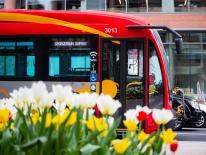
Transportation Demand Management (TDM)
The District’s transportation demand management (TDM) program is designed to help achieve the mode share goal set forth in moveDC by implementing strategies and transportation amenities to shift travel demand and change traveler behavior. The TDM program is organized around a three-pronged approach to reduce single-occupancy vehicle (SOV) travel and encourage the use of public transit, biking, walking, teleworking, and ridesharing:
- Promoting sustainable transportation options and amenities through DDOT’s outreach and marketing brand called goDCgo;
- Reducing impact on the transportation network from new development projects by helping developers right-size their TDM plans to mitigate additional vehicle trips; and
- Advocating for and implementing smart policies and laws.
goDCgo
As the leading resource for transportation information in the District, goDCgo provides commuters, employers, residential property managers, schools, hotels, and visitors with the education and assistance they need to make more informed choices about their daily travel. By helping with the development and implementation of commuter benefits programs and transportation amenities, goDCgo encourages the use of sustainable transportation, including walking, biking, and taking public transit. The program reduces single-occupancy vehicle (SOV) travel, decreases traffic congestion, and improves air quality to create a better quality of life in the District.
Visit https://goDCgo.com to find out more or contact us at [email protected] and 202-299-2186.
DC Parking Cashout Law
Transportation Benefits Equity Amendment Act of 2020
The DC Omnibus Amendment Act of 2014 was amended to include the Transportation Benefits Equity Amendment Act of 2020. The new law requires employers with 20 or more employees who offer free or subsidized parking benefits to employees to implement one of three compliance options that encourage commuting using sustainable transportation options instead of driving to work.
Covered employers must implement one of the following compliance options:
- Offer a Clean Air Transportation Fringe Benefit: offer the equivalent value in benefits to covered employees who do not drive to work in the form of a transit subsidy, increased compensation, and/or a healthcare contribution;
- Implement a transportation demand management plan: create a DDOT-approved TDM plan and reduce employees’ commuter trips make by car by at least 10% year over year until 25% or less of employees’ commuter trips are made by car;
- Pay a Clean Air Compliance fee to DDOT: pay $100 per employee per month who is offered a parking benefit; or
- Report an exemption to DDOT: if you do not offer free, subsidized, or reimbursed parking to employees, or you qualify for one of the other exemptions (such as owning your parking prior to October 2020), report that exemption to DDOT.
Reporting
All District employers with 20 or more covered employees must report their compliance or exemption to DDOT every two years by January 15, starting January 15, 2023. Covered employers electing to implement a TDM Plan must submit a commuter survey report every year.
Submit compliance reports here: Reporting Portal
Employer Resources
Read the legislation here: D.C. Law 23-113. Transportation Benefits Equity Amendment Act of 2020.
Visit goDCgo Employer Services and scroll to “DC Parking Cashout Law” for more info and to get started.
Download the DC Parking Cashout Toolkit for Employers for step-by-step implementation guidance.
Download the DC Parking Cashout Employer Flyer for a quick overview of compliance options.
DC Commuter Benefits Law of 2014
(DC Omnibus Amendment Act of 2014, Title III: Equity and Diversity, Subtitle A: Reducing Single Occupancy Vehicle Use and Encouraging Transit Benefits)
As part of the Sustainable DC Omnibus Amendment Act of 2014, the Council of the District of Columbia passed a Commuter Benefits Law that requires businesses with 20 or more employees in Washington, DC to offer commuter transit benefits.
As of January 1, 2016, DC employers with 20 or more employees (including non-profits) are required to provide at least one of the following commuter benefit options:
- Employee-Paid, Pre-Tax Benefit; allow employees to set aside income on a pre-tax basis to cover the cost of commuting by mass transit or vanpools, up to $280 per month.
- Employer-Paid, Direct Benefit; offer a tax-free subsidy for transit or vanpools, up to $280 per month.
- Employer-Provided Transportation; Provide shuttle or vanpool service at no cost to employees.
D.C. Law 20-142. Sustainable DC Omnibus Amendment Act of 2014.
Visit goDCgo Employer Services for more info and to get started.
Download the Employer Commuter Benefits Toolkit for step-by-step implementation guidance.
Development Review
As the District grows and attracts new developments, DDOT has implemented a plan to minimize site-generated vehicle trips. The DDOT Comprehensive Transportation Review Guidelines provide standardized TDM plans by land use, user type, and project impact for development that work in tandem with reduced parking, priced parking, and nearby transit. There are three tiers of plans, each tied to the amount of on-site parking and identified traffic impacts.
- The Baseline Plan includes relatively inexpensive and easy-to-implement strategies like unbundled parking, appointing a site TDM coordinator to work with DDOT’s TDM program, providing welcome packets to new residents highlighting non-auto options, and designing bike facilities to accommodate non-traditional bikes.
- The Enhanced Plan builds on the Baseline Plan and includes items that require more effort to implement. These include installing a digital transit information screen, installing additional bike parking, and agreeing to not lease out excess unused parking to other buildings.
- The Enhanced Plus Plan is for sites that are significantly over-parked or have unmitigated intersection impacts and are intended to be substantive enough that they act as a disincentive to over-parking the site. These include a multi-year commitment to providing bikeshare memberships to all residents or employees, installing a 19-dock Capital Bikeshare station, providing SmarTrip cards preloaded with fares, cash contributions to the Transportation Mitigation Fund, and a package of non-automotive improvements.
Refer to Appendix C of the CTR Guidelines for standardized TDM plans for the residential, office, retail, and hospitality land uses.